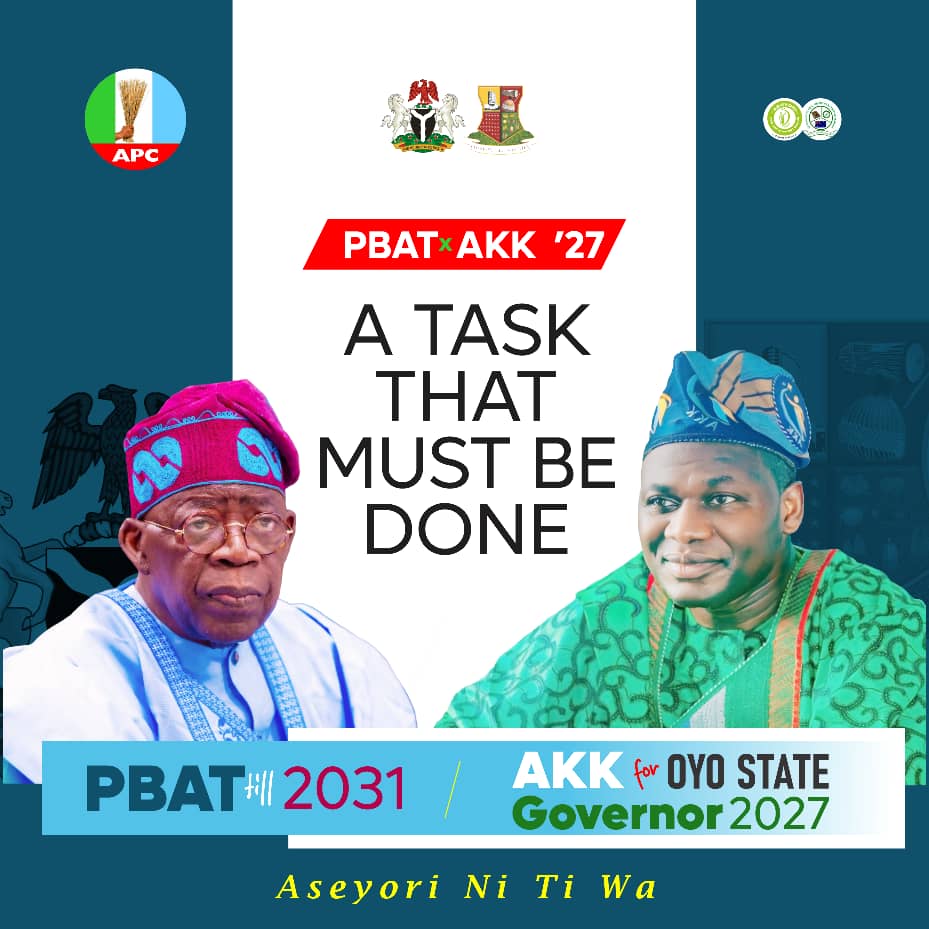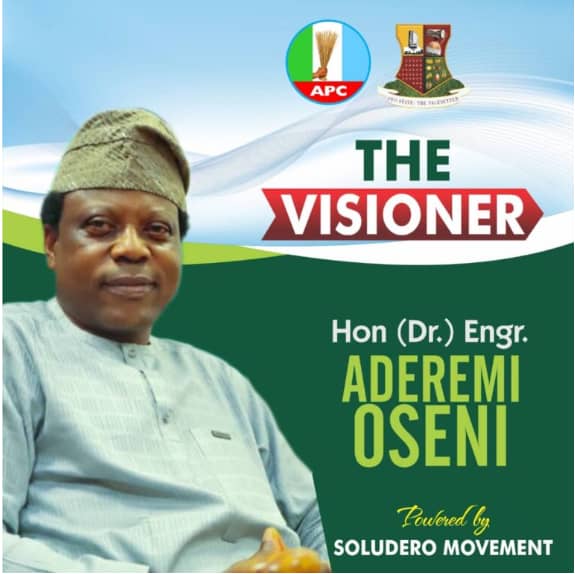
By Busola Oworu
The interplay of religion, zoning, intrigues and the growing list of contenders jostling to succeed Governor Seyi Makinde at Agodi Government House.
AS Oyo State edges closer to 2027, attention appears to be shifting from governance to succession in 2027. Who succeeds Governor Seyi Makinde at Agodi Government House is now the central question shaping conversations in political circles, religious communities, traditional institutions, and the everyday chatter of ordinary citizens across the state.

What makes this contest especially captivating is not just the personalities involved but the unique mixture of history, religion, zoning, and the assumed governor’s personal determination to influence the outcome. In a state where politics is as unpredictable as its people are politically conscious, the road to Agodi promises to be anything but straightforward.

Burden of continuity

Governor Makinde has governed with a blend of technocratic reforms and populist touches that have raised expectations of leadership in Oyo. His investments in agribusiness, education, healthcare, infrastructure, and security have given the state a reputation for stability and progress in the South-West. His transparency, inclusiveness, and youthful energy have also endeared him to a large section of the public.
But Makinde seems to know legacies are fragile. In his words at several fora, he has emphasised that he wants a much younger successor, one capable of sustaining and even expanding the reforms he has introduced. If he succeeds in installing such a successor, he would become the first Oyo governor in the Fourth Republic to successfully pass the baton to his chosen candidate. Neither Lam Adesina, Rashidi Ladoja, Adebayo Alao-Akala, nor Abiola Ajimobi achieved this. Yet, Oyo politics is famously fluid. It is shaped not only by incumbency but also by ethnic balancing, religious undercurrents, the influence of godfathers, and the moods of an electorate known for springing surprises.
Religion and zoning as twin shadows
No Oyo election is complete without the politics of zoning and religion. Since 1999, the governorship has rotated informally between Ibadan and Ogbomoso, leaving Oke-Ogun and Ibarapa zones feeling marginalised. Oke-Ogun, in particular, despite being the agricultural backbone of the state, has never produced a governor. Many argue that the time has come for power to shift there. On religion, the calls are equally pronounced. Oyo’s population is almost evenly divided between Muslims and Christians. Yet, in recent cycles, Christians have had an upper hand. Makinde is Christian, and so was Adebayo Alao-Akala, while Lam Adesina, Ajimobi and Ladoja were Muslims. For 2027, strong Muslim blocs insist that religious balance demands a Muslim governor. This means that any aspirant, whether in PDP or APC, will be judged not only by competence but also by whether they can satisfy these twin demands of fairness.
PDP contenders
Governor Makinde’s ruling party, the PDP, is under pressure to retain power. The governor has not publicly endorsed anyone, but names are already circulating.
Adebo Ogundoyin
At 36, Ogundoyin is Nigeria’s youngest Speaker and currently heads the Conference of Speakers nationwide. His Ibarapa pedigree, youthfulness, and loyalty to Makinde make him an attractive option. He fits the governor’s public preference for a younger successor and has kept the Assembly firmly in Makinde’s corner. But his candidacy faces two obstacles: religion and zoning. Ogundoyin is a Christian from Ibarapa.
Debo Akande
The technocrat in Makinde’s kitchen cabinet, Akande, heads the state’s agribusiness agency (OYSADA) and advises Makinde on international cooperation. He has attracted investment, secured partnerships with global institutions, and designed youth empowerment programmes. His international profile makes him appealing to elites and development partners. However, he is Christian and Ibadan-born. Without grassroots structures, his candidacy would depend heavily on Makinde’s political weight. If chosen, Makinde would be asking Oyo people to overlook zoning and religious sentiment in favour of continuity and expertise.
Adegboyega Adegoke
Businessman, philanthropist, and traditional titleholder, Adegoke is well-known across Ibadan. His philanthropy during the COVID-19 pandemic, coupled with his ownership of a radio station, has given him visibility. His billboards already dot the capital. He is seen as ambitious and financially capable, but his Ibadan/Christian identity poses the same challenge as the other PDP hopefuls. His advantage lies in grassroots philanthropy, which could win him support if PDP opts for a populist candidate.
Niyi Aborisade
A rights activist and UK-trained lawyer, Aborisade is outspoken about governance reforms and social justice. He offers a radical alternative within the PDP, one less tied to the establishment. But he is relatively new to mainstream politics and lacks the machinery and cross-zonal networks needed for a governorship battle.
The APC gladiators
The APC, having suffered two back-to-back losses to Makinde, is desperate to reclaim power. With President Bola Tinubu as its national leader, the party is better positioned for 2027. But internal divisions remain its Achilles heel.
Adebayo Adelabu
Currently Minister of Power, Adelabu’s return to APC after his Accord Party defection has reignited debates. He is a Muslim from Ibadan and the grandson of the legendary Adegoke Adelabu (Penkelemesi). His technocratic profile as a former CBN Deputy Governor is impressive, and his ministerial office gives him visibility and resources. Yet, many in APC still blame his 2022 defection for the party’s loss in 2023. Winning their trust fully may be his biggest hurdle. But religiously and structurally, Adelabu ticks boxes that PDP candidates may struggle with.
Teslim Folarin
A seasoned Ibadan Muslim politician with over two decades in the Senate, Folarin is one of the strongest names in the race. He knows Oyo’s political terrain inside out and commands grassroots support. His legislative record is long, though opinions on his achievements are mixed. However, his strained ties with Tinubu raise doubts about whether he can get national backing. Speculation that he may defect to the ADC has also cast uncertainty over his plans. Still, his influence in Oyo APC is undeniable.
Remi Oseni
As a serving House of Representatives member and chairman of FERMA Committee, Oseni has made empowerment and grassroots connection his brand. A Muslim from Ido/Ibarapa East, he represents both youth and zoning interests. His “liberation agenda” resonates with younger voters. Some observers claim he lacks the deep political structures of Adelabu or Folarin but others say he could emerge as a compromise candidate if APC seeks generational change.
Adebayo Shittu
The former Minister of Communications is a Muslim from Oke-Ogun, a zone clamouring for the governorship. Shittu has consistently argued for power rotation, and his candidacy would satisfy both religious and zonal fairness. He is respected for his intellect and long political career, but critics say his electoral appeal in Ibadan, which dominates voting strength, is limited.
The X factor: The electorate
Religion and zoning aside, Oyo’s voters are politically discerning. In 2019 and 2023, they rejected heavyweights in favour of Makinde, a relatively new face with technocratic appeal. This shows that structures alone no longer guarantee victory. Voters will demand clear plans on pressing issues, one of which is how aspirants will tackle unemployment, especially among restless youths. Others include: how will they sustain agribusiness and industrialisation? How will they address insecurity, rural poverty, and food production? What will they do differently from Makinde? In short, Oyo’s electorate will not be easily swayed by rhetoric, handouts, or identity politics alone. Aspirants must blend competence with balance.
Stakeholders speak
As the race for Agodi intensifies, analysts and commentators are already weighing in on the possible outcomes of Oyo’s 2027 succession battle. Akeem Salawu, a young politician, said: “Oyo State is in a forward-thinking move, and transforming ideas into employment opportunities. According to Salawu, this is not an era of tokenism; it’s a true ballot revolution where the youth are empowered to lead change, whether through e-governance platforms enabling real-time feedback or agro-startups driving sustainable growth.
Dr. Rotimi Adeyemi, a political scientist, University of Ibadan, also spoke on the matter. He said: “The succession in 2027 will test whether Makinde’s popularity can be transferred to a chosen candidate. History in Oyo shows that incumbents rarely succeed in imposing successors. The electorate here values independence, and anyone presented without broad consultation risks rejection.”
Mallam Sulaiman Akinola, Religious Affairs Commentator from Saki, on his part, stated: “For Muslims, the feeling is clear, it is time for balance. Since Makinde is Christian, many believe the next governor should be Muslim to maintain fairness. This sentiment is strongest in Oke-Ogun and Ogbomoso, and any party that ignores it will face serious mobilisation against them.”
Professor Kayode Olabisi, Political Historian, Ibadan, opined: “Adebo Ogundoyin is young, loyal to Makinde, and politically visible. But being both Ibadan-born and Christian complicates his chances. Unless he can strike alliances beyond his natural base, his candidacy could be resisted by blocs seeking balance.”
Mrs. Aminat Ajibola, Grassroots Mobiliser from Okeho, said: “Debo Akande is very competent, but politics here is not won by competence alone. It is about grassroots presence. Villagers want someone who attends their festivals, mourns with them, and provides boreholes, not just someone who signs MoUs with the World Bank.”
On his part, Segun Alamu, an independent political analyst, said: “Adelabu is working hard to rebuild trust after his defection, but scars remain. His greatest strength is his profile as a minister and financier, yet his greatest weakness is the suspicion that he is too transactional in politics.”
Dr Oladele Ojo, a lecturer at the Lead City University, Ibadan, stated: “Teslim Folarin is a master of survival in politics. But his strained ties with Tinubu could be his undoing. In today’s Nigeria, national backing often determines who flies the flag. If Tinubu withholds support, Folarin may struggle to regain momentum.”
Kehinde Alaran, a public commentator, Ibadan, stressed: “At the end of the day, Oyo voters want fairness and competence. They are tired of endless promises. Whoever convinces the people that they can deliver jobs, security and fairness, not just politics as usual, will carry the day in 2027.”
A battle like no other
The 2027 governorship election in Oyo is shaping up to be one of the most intriguing in the state’s political history. For the PDP, the challenge is whether Makinde can impose a Christian, Ibadan-born successor without triggering a backlash from Muslims and ‘marginalised zones.’ For the APC, the test is whether it can unite its warring factions and capitalise on the electorate’s yearning for balance.
Above all, the battle for Agodi will not just be about who has the deepest pockets or strongest structures. It will be about who embodies fairness, inspires trust, and convinces the people that they can match or surpass Makinde’s developmental strides.
In the views of many observers, for the state, 2027 is more than an election; it is a referendum on equity, religion, and the enduring question of who truly represents the people’s aspirations.